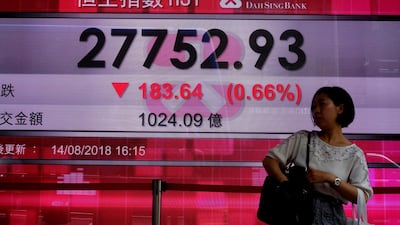Pressure on emerging markets shifted from currencies to stocks in Asian trading Wednesday, as prospects for higher funding costs threaten to diminish the appeal of companies benefiting from faster economic growth than in the developed world.
The MSCI Asia Pacific Index of shares was down 1 per cent as of 11:46am in Hong Kong, with benchmarks in Jakarta sliding 3.1 per cent and Manila 1.7 per cent. Indonesia’s rupiah - one of the region’s more vulnerable thanks to the country’s external financing needs, was little changed after hitting its weakest since the Asian financial crisis Tuesday.
Underlying the moves: continuing strength in the dollar that’s making offshore debt servicing more costly for borrowers from Brazil to Malaysia to South Africa. A negative tone was set Tuesday on the one hand by strong US manufacturing data that boosted the odds of further Federal Reserve tightening, and on the other by news that South Africa’s economy had slumped into recession.
“There seems to be no sign of halting the downtrend” for emerging-market assets, said Koji Fukaya, chief executive at FPG Securities in Tokyo. “Investors have become more selective, and countries with negative news such as weak economic growth, weak external balances and high inflation face stronger sell-offs.”
Indonesian equities extended their slump into a fifth day as policy makers attempt to support the rupiah through measures including interest-rate hikes that threaten to slow Southeast Asia’s biggest economy. Shares in the Philippines stayed lower after a report showed inflation - spurred in part by currency weakening - surged past 6 per cent last month, foreshadowing further potential rate rises there.
Outside the Asian region, worries remain that Turkey’s central bank may not do enough at its policy meeting next week to shore up confidence. And Argentina’s economic outlook has deteriorated even as its officials negotiate with the IMF for accelerated aid.
_______________
Read more:
Looming US political risks pose a real threat to the markets
Currencies under the spotlight amid trade woes
_______________
MSCI’s index of developing-nation currencies slipped, heading for the lowest close in more than a year. The greenback is hovering near its highest level in over a year after a gauge of American manufacturing jumped to a 14-year high Tuesday.
As US rates rise, investor fears over idiosyncratic risks in emerging markets have climbed, from Argentina’s fiscal woes and Turkey’s twin deficits to Brazil’s contentious elections and a land-reform bill in South Africa. President Donald Trump’s threats to ramp up a trade spat with China with an announcement of tariffs on as much as $200 billion in additional Chinese products as soon as Thursday also hasn’t helped.
Fixed income has also been hit, with the Bloomberg Barclays emerging-market index for dollar bonds down almost 4 per cent so far this year. That leaves it heading for its first negative annual performance since 2013, the year of the taper tantrum.
One silver lining for now is that China, has taken steps to shore up its own currency, including through the re-introduction of a counter-cyclical factor in the yuan’s daily fixing. Policymakers in the biggest emerging market have also taken steps to sustain rapid growth, helping hold up global demand more broadly.
Anastasia Amoroso, a global investment strategist at JPMorgan Private Bank in New York, said emerging markets are the best asset class for the long-term due to growth potential, but the time hasn’t come yet to start buying.
As long as trade wars continue and the Fed hikes at a runaway pace versus the rest of the world, dollar strength will persist.
Morgan Stanley stays short on the currencies of Brazil, Mexico, South Africa, Russia, Indonesia, India and Philippines against the dollar, euro and yen, according to James Lord, an emerging-market strategist at Morgan Stanley in London. September is unlikely to provide much relief to emerging markets, Mr Lord and his colleagues at the bank wrote in a note.
Trade tensions may remain a theme, and worries about Brazil’s election campaign will probably intensify. Investors may also focus on the outflows of so-called real money, sanctions on Russia and South African land reform over coming months.
Kay Van-Petersen, global macro strategist at Saxo Capital Markets, said: “It has to get a lot worse before it gets better. When you get full contagion, everything gets thrown out, and we’re not there yet.” The key catalyst could be Turkey, he said.
The market has underpriced expectations for the Fed, and with Mr Trump waging trade wars on multiple fronts, the tariffs end up hurting emerging markets more than they hurt the US.

